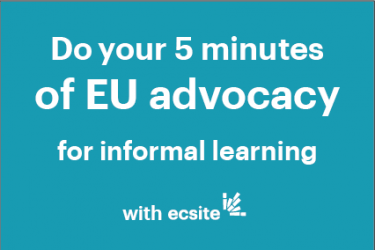Ecsite encourages all members to answer the "Promoting Social Inclusion and Shared EU Values through Formal and Non-Formal Learning" consultation launched by the European Commission and open until 11 August. The more we are to answer, the more impact we will have - Ecsite put together a rationale we hope you'll find useful to answer.
The consultation consists in about 20 tick-box questions and the opportunity to publish a position paper on the following question: "What could the EU do to help Member States ensure that their education and training systems, and in particular the learning environments, help people understand and take ownership of shared EU values and promote fair and inclusive societies?"
More about the rationale produced by Ecsite
This paper was written for Ecsite by Barbara Streicher, General Manager at the Association ScienceCenter-Netzwerk, Austria and inspired by Antonio Gomes da Costa's article 'From Ear Candling to Trump: Science Communication in the Post-Truth World', Spokes #27, February 2017.
Barbara is one of the co-organisers of an international working group working on the idea of devising a "social inclusion and diversity framework" with measurable indicators for success that could support the development of our field. This group saw the light after keynote speaker Liz Rasekoala challenged the European science communication field on how (poorly) science museums and science centres deal with inclusion, diversity and equity issues at the 2016 Ecsite Annual Conference.
The rationale she produced is meant as a support or inspiration for the position paper part of the survey. You can use it on your own letterhead as you wish, modify it if you want. We simply ask you to mention at the end "Inspired by Ecsite, Barbara Streicher, Association ScienceCenter-Network, Austria and Antonio Gomes da Costa, 'From Ear Candling to Trump: Science Communication in the Post-Truth World', Spokes #27, February 2017".
More about the survey's European context
As explained in the survey introduction:
"European Commission is preparing a proposal for a Council Recommendation on promoting social inclusion and shared values through formal and non-formal learning. The initiative is following directly upon the Paris Declaration on promoting citizenship and the common values of freedom, tolerance and non-discrimination through education adopted in March 2015, in which Education Ministers invited Member States and the European Commission to reinforce cooperation at EU level in four areas:
(i) Ensuring that children and young people acquire social, civic and intercultural competences, by promoting democratic values and fundamental rights, social inclusion and non-discrimination, as well as active citizenship;
(ii) Enhancing critical thinking and media literacy, particularly in the use of the Internet and social media, so as to develop resistance to all forms of discrimination and indoctrination;
(iii) Fostering the education of disadvantaged children and young people, by ensuring that our education and training systems address their needs;
(iv) Promoting intercultural dialogue through all forms of learning in cooperation with other relevant policies and stakeholders."

